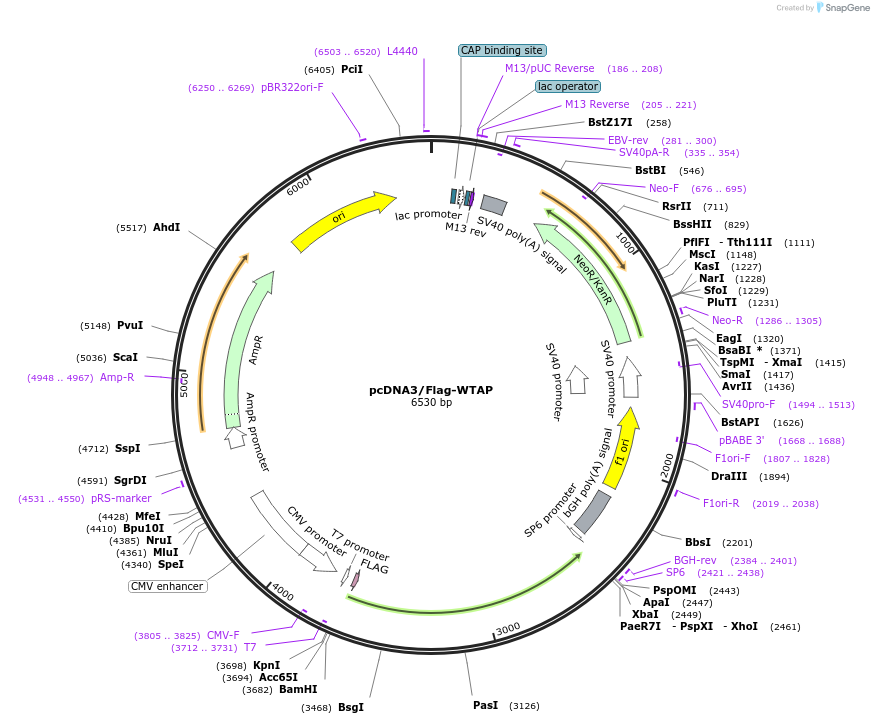-
PurposeFor expression of WTAP (Wilms tumor 1 associated protein) in human cells
-
Depositing Lab
-
Sequence Information
Ordering
| Item | Catalog # | Description | Quantity | Price (USD) | |
|---|---|---|---|---|---|
| Plasmid | 53741 | Standard format: Plasmid sent in bacteria as agar stab | 1 | $89 | |
Backbone
-
Vector backbonepcDNA3
-
Backbone manufacturerInvitrogen
- Backbone size w/o insert (bp) 5446
- Total vector size (bp) 6579
-
Modifications to backboneN.A.
-
Vector typeMammalian Expression
Growth in Bacteria
-
Bacterial Resistance(s)Ampicillin, 100 μg/mL
-
Growth Temperature37°C
-
Growth Strain(s)DH5alpha
-
Copy numberUnknown
Gene/Insert
-
Gene/Insert nameWilms tumor 1 associated protein
-
Alt nameWTAP
-
SpeciesH. sapiens (human)
-
Insert Size (bp)1191
-
GenBank IDNM_001270531.1
-
Entrez GeneWTAP (a.k.a. Mum2)
- Promoter T7
-
Tag
/ Fusion Protein
- FLAG tag (N terminal on insert)
Cloning Information
- Cloning method Restriction Enzyme
- 5′ cloning site BamHI (not destroyed)
- 3′ cloning site XhoI (not destroyed)
- 5′ sequencing primer 5' TAATACGACTCACTATAGGG 3'
- 3′ sequencing primer 5' ATTTAGGTGACACTATAG 3'
- (Common Sequencing Primers)
Resource Information
-
A portion of this plasmid was derived from a plasmid made bycDNA was obtained from Open Biosystems
-
Articles Citing this Plasmid
Terms and Licenses
-
Academic/Nonprofit Terms
-
Industry Terms
- Not Available to Industry
Trademarks:
- Zeocin® is an InvivoGen trademark.
These plasmids were created by your colleagues. Please acknowledge the Principal Investigator, cite the article in which the plasmids were described, and include Addgene in the Materials and Methods of your future publications.
-
For your Materials & Methods section:
pcDNA3/Flag-WTAP was a gift from Chuan He (Addgene plasmid # 53741 ; http://n2t.net/addgene:53741 ; RRID:Addgene_53741) -
For your References section:
A METTL3-METTL14 complex mediates mammalian nuclear RNA N6-adenosine methylation. Liu J, Yue Y, Han D, Wang X, Fu Y, Zhang L, Jia G, Yu M, Lu Z, Deng X, Dai Q, Chen W, He C. Nat Chem Biol. 2014 Feb;10(2):93-5. doi: 10.1038/nchembio.1432. Epub 2013 Dec 6. 10.1038/nchembio.1432 PubMed 24316715



